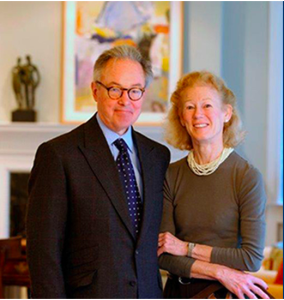Krissie Esselfie ‘21, Avani Narula ‘21, Morgan Bramwell ‘21:
The newly founded Lilley Fellowship will allow Episcopal students to expand both their academic interests and JTerm experiences by conducting additional, extensive research over the course of several months. Beginning this spring semester, “the new Lilley Fellowship offers students additional opportunities to further their interests and passions,” says Head of Upper School, Michael Letts.
William Lilley, a graduate of the class of 1955, first got the idea for the Lilley Fellowship about two summers ago when he decided to visit the new Newtown Square campus for the first time. “While at Episcopal, Lilley heard from some of our JTerm teachers and students and he really felt like this was a program that he wanted to support and get behind. In fact, he decided to take the JTerm idea a step further,” explains Interim Director of Institutional Advancement Jennifer Fifer. Lilley’s idea formed the basis for what would eventually become the Lilley Fellowship.
Although Lilley’s idea was primarily original, he did get some inspiration from a program at Yale, his alma mater. “There used to be a program at Yale called the Scholar House where a student would be selected to do an independent study throughout one of their semesters. They would work with a faculty mentor to do this deep dive into that study,” says Fifer. It was this program upon which Lilley based the Lilley Fellowship.

The fellowship will give students the opportunity to research areas that interest them when they may not necessarily have the resources to do so otherwise. The program was specifically created to allow students to expand on their J-term courses. “The purpose of the Lilley fellowship is to provide students with the opportunity to pursue an independent study unlike any other at Episcopal,” John Kelly, the Head of the Lilley Fellowship committee and Upper School history teacher, explains. By providing qualified students with a large grant, students may use the stipend to conduct research, experiments, or simply travel to new places over the course of the summer. At the end of the course, they present what they have learned. “If seniors get selected to be a fellow they have from February until May 22nd to complete the fellowship. If you are an underclassman, freshman through juniors, you would have not only the spring semester, but the summer. Their final presentation would be in September,” Kelly explains.
The intent of the Lilley Fellowship is mainly to give students more chances to find out what they are truly passionate about. Letts asserts, “The Lilley Fellowship will allow [the students] to expand on JTerms and investigate that further to find out if that’s something that they really enjoy or something they might want to pursue in college or possibly as a career. Because ultimately, that is what really is most important as you go off into the great wide world: pursuing your passion.”
There are several projects students could do with the Lilley Fellowship stipend. With the grant, the possibilities are limitless. “I can imagine what certain students will want to do,” Letts elaborates. “We have a number of community service trips and community service programs, so my guess is that there will be quite a few applications for that. Another idea could also be historical research, since we have a lot of history related JTerm courses. However, what I’m always amazed at is the creativity you students have, so I’m sure there will be some fantastic ideas that come from this opportunity.” Although community service and history may be hot topics for the Lilley Fellowship grants, the grant could be awarded to any qualifying application.
All in all, the hopes are that the Lilley Foundation will bring the EA community a new way to help students figure out what they are truly passionate about, and what they want to commit to for the rest of their life. As Fifer puts it, “I think the Lilley Fellowship is going to be one of those transformational programs that helps students learn and grow in new ways.”